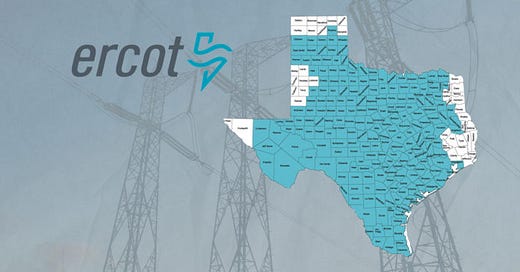ERCOT warns summer outages possible due to EPA "Good Neighbor Plan"
EPA rule could be a big problem for all power grids
The Electric Reliability Council of Texas (ERCOT), the entity that operates the power grid in Texas, released its “Seasonal Assessment of Resources Adequacy” (SARA) report for the Summer of 2023 on May 3, 2023. As expected, it begins optimistically:
Assuming that the ERCOT Region experiences typical summer grid conditions, ERCOT anticipates that there will be sufficient installed generating capacity available to serve the system-wide forecasted peak load for the upcoming summer season, June - September 2023.
In the next paragraph, the report admits that their outlook does not take into account the weather:
The base summer peak load is 82,739 MW. This load amount is based on average weather conditions at the time of the summer peaks for years 2007 through 2021, and does not incorporate ERCOT's summer 2023 weather outlook. Weather forecast information, including the 2023 summer weather outlook, is available at: https://www.ercot.com/gridmktinfo/dashboards/weatherforecast.
That seems strange since the weather outlook is one of the main factors determining the air conditioning load. Summers in Texas can be brutally hot, but not all are. For example, the Texas grid broke demand records 11 times last summer when electricity demand reached 80,000 megawatts, but this Spring has been very mild. (The saying is if you don’t like the weather in Texas, wait a few minutes).
After a long paragraph detailing some new thermal and solar generation that is expected to come online by July 2023, the report interjects a cautionary paragraph saying that the EPA could be a big problem this summer:
ERCOT and thermal generation owners are closely monitoring the potential impacts of the U.S. Environmental Protection Agency’s March 15th approval of its “Good Neighbor Plan” for reducing cross-state emissions of ozone-forming nitrogen oxides (NOx). Several generation owners in the ERCOT region indicated the potential that certain generators may face operational constraints in complying with the Program's provisions as soon as July 2023. Texas, Louisiana and other parties filed a motion with the Fifth Circuit court to stay the EPA’s regulatory action due to potential reliability impacts. On May 1, 2023, the Court granted the motion to stay the EPA action.
I read this paragraph as ERCOT’s warning that the EPA’s “Good Neighbor Plan” is likely to be a key factor determining the reliability of the ERCOT grid this summer. Under this plan, EPA can reduce the output or even shut down “electric generating units,” meaning coal-fired plants, that expel nitrogen oxides that cross state borders and increase ozone levels in neighboring states.
ERCOT says that EPA has already informed several Texas coal-generating plants that they may “face operational constraints…as soon as July 2023".” Texas and Louisiana sued to stop the EPA from enforcing the plan, and the Fifth Circuit of Appeals issued an order to prevent the action on May 2, 2023, but that could be reversed in another court action. ERCOT says that if the EPA enforces the “Good Neighbor Plan,” Texans can expect grid problems that call for voluntary reductions in electricity usage, brownouts, or worse. This EPA rule can impact all U.S. power grids.
ERCOT’s final note is:
The summer SARA includes two Risk Scenario tabs: Base & Moderate Risk Scenarios, and Extreme Risk Scenarios. The most severe Risk Scenario assumes a high peak load, extreme unplanned thermal plant outages based on historic observations, and extreme low wind power production (emphasis added).
ERCOT finally gets to the bottom line by saying that the ERCOT grid will be fine unless (1) the summer is as hot as last year’s or hotter, (2) the wind stops blowing or blows less, or (3) there are no widespread fossil fuel plants outages. The fact is that all three of those events are entirely possible because they have happened in previous summers.
I would characterize ERCOT’s outlook for the grid as optimistically cautious. However, a fundamental uncertainty that ERCOT does not mention is that the Texas Legislature is currently debating major legislation that could significantly impact the reliability of the Texas power grid for years to come.
The Legislature is debating many different and significant bills regarding the structure of the ERCOT grid, and this legislative session ends on May 29. Lt. Gov. Dan Patrick, who presides over the chamber, said he would not let legislators go home until they agree on bills to ensure the power grid's stability. The Lt. Governor is right about finalizing the bills because the Texas legislature meets every other year for 140 days. (An old joke is the framers of the Texas constitution wanted the Legislature to meet for two days every 140 years but settled on 140 days every two years.) So passing legislation to stabilize the power grid is too important to wait two more years.
A flurry of bills was introduced in this legislative session to address the problem that wind and solar have destabilized the Texas power grid due to their unreliability and the retirements of coal-fired generators. One bill proposed that the State of Texas build a statewide backup natural gas-fired generation system that would only be used in times of crisis. But unfortunately, the idea of state-owned facilities didn’t sit well with many legislators and companies, so support for that bill withered.
The debated bills would create a no-interest loan program for private companies to build new natural gas-fired plants and pay them roughly 10 percent of construction costs if construction begins before December 2024 and is in operation within three years.
Whatever gets approved in the Texas Legislature may become a model for other grids and states to consider. Many power grids in the U.S. have sounded alarms that their grids have become destabilized by the overabundance of wind and solar. Texas is the first U.S. power grid to try to craft plans to deal with the problem. Stay tuned!





Great update. Thank you!